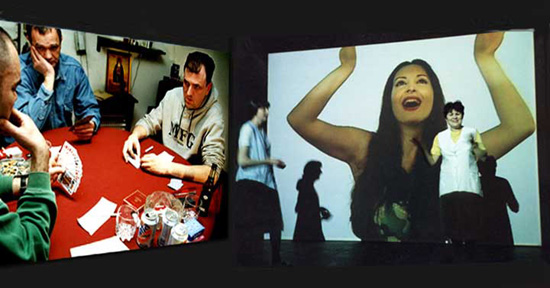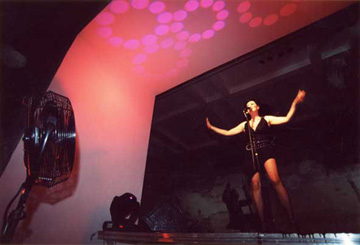| |
Milica Tomic

"Sama"
("Alone"), 2001
Video
installation consisting of two video screens placed back to
back. The first video is a 36-minute loop and the second is
a 9-minute loop. Both of them have sound and color.
In the
first video, three men are playing the card game preference.
This group usually plays preference together, but this time
they find out just before the game starts that they are going
to play for high stakes. This card game is played in Tomic's
country in almost all social and intellectual circles as typical
entertainment for all-male groups, often in the back room
of bustling cafes. However, the game is not only for entertainment,
it represents the traits that are valued in our society: power,
intelligence, cleverness, fast-thinking, and courage. Important
business, social and political decisions are being formed
through this interaction. The game reflects the way the dominant
power structure is reproduced in the micro social level. This
game borders on the private and the public realms, and has
very strict rituals of initiation for those who wish to participate.
They are enjoying this activity passively, unaware that they
are participating in a specific popular cultural form; this
group is also part of turbo-folk culture.
On the
other side of the video screen is a video of Dragana Mirkovic,
the most famous turbo-folk
star, performing her song "Sama" ("Alone").
Despite the discrepancy between the media representation of
the turbo folk star and the "unheimliche" of real
life, they support and nurture each other, as two sides of
the same instance. Male communities are never represented
in the media because the construction of the female body,
represented through the turbo-folk female stars, is merely
a projection of the male gaze from the viewpoint of privileged
invisibility, which the men gain through the ritualized initiation
into the brotherhood through the game of Preference. The construction
of the female body is actually a screen that protects them
from reality.
Turbo-Folk
Turbo-folk
is a musical genre that is known to exist only in Southeastern
Europe, and at first glance appears to be a phenomenon that
is meaningful only in a local context. However, it is linked
closely with the major events in the region over the last
ten years and is a symptom of global change. Turbo-folk marks
the point of the culturalization of politics, which is the
quintessential globalization. It is the representational device
of the Serbs' surrender of political subjectivity by perceiving
their culture to be the chosen place of the clash of civilizations
and the last stand of authenticity. Turbo-folk represents
"something" that only "we" can understand
and "something" which provides enjoyment "only
for us." Paradoxically, this musical creation which is
perceived to be "ours" to the exclusion of all others
("cosa nostra"), is actually a cross-breed. Turbo-folk
is an ideal joining of influences that are perceived as "hostile"
to one another. This genre is a mixture of the "oriental"
and "western" influences of the North African Rai
music (Arabic folk-pop) and modern European techno-dance.
So
what we consider to be "just ours" is in fact our
most authentic contribution to globalism. This phenomenon
has not been analyzed by theoreticians and artists as fully
as it deserves. The general reaction to local popular influence
on global culture has been non-reflective negative criticism,
disgust, and contempt. Further, critics who have identified
themselves in opposition to the bad taste of turbo-folk have
fueled negative cultural discrimination. However, their feeling
of disgust is a sign of their unconscious participation in
the enjoyment that helps to sustain and feed turbo-folk culture.
Performance
2001
text
by Branko Dimitrijevic

"I
kad jednom pukne ovo srce moje videces u njemu samo ime svoje"
"Performance"
consisted of a stage appearance by the turbo-folk superstar
singer Dragana Mirkovic accompanied by the New Beet Street
dance group. "Performance" was staged in the central
exhibition space of the international contemporary art exhibition
"Du bist die welt," 2001, at the Wienner Festwochen,
Kuenstlerhaus, Vienna. The subject of the exhibition was strategies
of globalism, and my choice to confront strategies of globalist
segregation explains the artistic choices that Tomic made.
The stage and performance space were an installation, thus
emphasizing that the pop culture in the piece is employed
as a ready-made.
Tomic
chose Dragana Mirkovic for my performance because she is one
of the greatest ex-Yugoslavian pop music stars and certainly
the biggest turbo-folk star. Turbo-folk is a musical genre
unique to South-East Europe, a cross between North African
Rai music and techno-dance music. In my opinion, it is our
most authentic and original contribution to the globalization
process. In other words, turbo-folk has paved the way for
globalization to enter isolated and excluded Serbia. The way
that the global enters the local scene is always one-way and
inherently exclusive. My intervention, one of dislocation,
functions on two levels. Dislocation of local genres in the
international scene and dislocation of pop culture in contemporary
art opens the one-way street into a passage for communication
in both directions.
Dragana
Mirkovicís appearance in Vienna introduced a new dimension
to the installation. A minority population of more than 250,000
ex-Yugoslav citizens live and work in Vienna and the rest
of Austria. They are completely invisible to the general Austrian
public; they are excluded and they exclude themselves from
the Austrian community. However, the appearance of Mirkovic
as a part of a contemporary art exhibition, in a high art
institution, was a breakthrough that worked in two ways. For
the first time this minority population was invited to and
made visible in an Austrian public space and for the first
time contemporary art entered these working-class immigrants'
world.
Milica
and Branimir proposed
to participate in the project from their home in Belgrade
|
